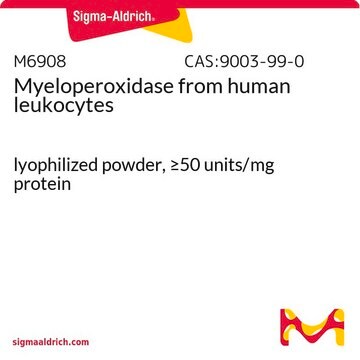390A
Leukocyte Peroxidase (Myeloperoxidase) Kit
Hanker-Yates substrate kit
About This Item
Produits recommandés
Utilisation
sufficient for 10-120 manual assays
Durée de conservation
Expiry date on the label.
IVD
for in vitro diagnostic use
Application(s)
hematology
histology
Conditions d'expédition
wet ice
Température de stockage
2-8°C
Vous recherchez des produits similaires ? Visite Guide de comparaison des produits
Application
Composants de kit seuls
- Acid Hematoxylin Solution (2852) 100 mL
- Peroxidase Indicator Reagent (3901) 10 vial(s)
Composants de kit également disponibles séparément
- 903CTRIZMAL™ 6.3 Buffer Concentrate, pH 6.3(concentrate), 0.2 M 50 mLFDS
Produit(s) apparenté(s)
Mention d'avertissement
Danger
Mentions de danger
Classification des risques
Acute Tox. 3 Dermal - Acute Tox. 3 Oral - Acute Tox. 4 Inhalation - Aquatic Acute 1 - Aquatic Chronic 1 - Carc. 1B - Eye Dam. 1 - Muta. 2 - Skin Irrit. 2 - Skin Sens. 1
Code de la classe de stockage
6.1C - Combustible acute toxic Cat.3 / toxic compounds or compounds which causing chronic effects
Point d'éclair (°F)
Not applicable
Point d'éclair (°C)
Not applicable
Certificats d'analyse (COA)
Recherchez un Certificats d'analyse (COA) en saisissant le numéro de lot du produit. Les numéros de lot figurent sur l'étiquette du produit après les mots "Lot" ou "Batch".
Déjà en possession de ce produit ?
Retrouvez la documentation relative aux produits que vous avez récemment achetés dans la Bibliothèque de documents.
Les clients ont également consulté
Notre équipe de scientifiques dispose d'une expérience dans tous les secteurs de la recherche, notamment en sciences de la vie, science des matériaux, synthèse chimique, chromatographie, analyse et dans de nombreux autres domaines..
Contacter notre Service technique
















